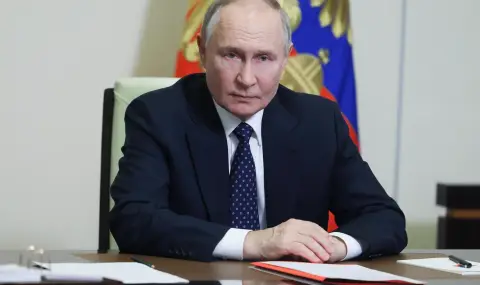Comment by Ivan Preobrazhensky:
Vladimir Putin announced that he supports the very idea of a 30-day ceasefire proposed by Ukraine and the United States after their talks in Saudi Arabia. But he is clearly not ready to stop hostilities now.
In his statement on Thursday, March 13, the Russian president spoke about the likelihood of further mobilization and arming of Ukraine, about the need to coordinate in advance the parameters for control and verification of the ceasefire scheme. And then he went straight to the liquidation of the "Kiev regime" and the refusal to join NATO - i.e. to what Putin has long been trying to present as the reasons for Russia's aggression against Ukraine. In response, Donald Trump called these statements "promising, but incomplete". And there is practically no chance that this will change after the two talk.
Leading Trump by the Nose
Despite the subsequent night meeting between Vladimir Putin and the US President's special envoy, Steve Witkoff, Russia's position on the 30-day ceasefire did not become clearer. The results of the negotiations were not announced, and the special envoy did not fly from Moscow to the US - he took off for unknown reasons to Azerbaijan. It is not known when Trump will be informed of the effect of the talks and whether there is anything to be informed of at all - although the Americans express "cautious optimism".
Everyone is now waiting for Putin's personal telephone conversation with the American leader. Some commentators suggest that this conversation could be decisive. But does the US have the resources to force the Russian ruler to an immediate response?
In fact, Moscow is not obliged to give an immediate response at all. From the behavior of Putin and his entourage, one can conclude that they themselves see two key tasks before them, which at first glance seem mutually exclusive. The first is to continue the offensive and strikes against Ukraine. It is no coincidence that Putin organized a "masquerade" by dressing up in military clothes ala Zelensky and even allegedly going to the Kursk region, where Ukrainian troops have almost withdrawn. Putin's press secretary Dmitry Peskov unequivocally called this "a signal of determination". The Kremlin is clearly sure that in the fighting with Ukraine the advantage is on its side, and as long as this is the case, there is no point in taking a break.
The second task: not to agree to Washington's proposals and not to participate in peace negotiations, nor in a personal meeting with Trump, so that the Russian representative cannot be cornered, as the Americans tried to do with Volodymyr Zelensky. Simply put: not to fall out with the US, to maintain Trump's sympathy and not to allow him to become a personal enemy. For now, this sympathy (as well as antipathy towards Zelensky) is entirely in favor of the Kremlin.
The Kremlin's tactics and invisible new sanctions
Donald Trump clearly does not want to spoil his relations with Putin either. Putting firm pressure on the Russian ruler would make sense when he is sitting opposite you at the negotiating table. But so far, Russia has not entered into serious negotiations at all. Therefore, they are trying to push it to this mainly with flattery and promises of big concessions at the expense of Ukraine, for example, on the issue of occupied territories. Another example is the rumors about the de facto removal from the negotiations at the request of the Kremlin of Keith Kellogg, who, according to the Russian leadership, is too pro-Ukrainian.
This method is typical of the strategy of tough business negotiations that Trump adheres to. At the same time, it cannot be said that he used only carrots, but not sticks. On the day of the trip to Moscow of special envoy Steve Witkoff, it became known that the license to make payments for energy resources, previously granted by the Americans to Russian banks, was not extended.
This is a clear signal to Putin from Trump and means: hurry up, agree to the truce, because I may get hurt.
With a prayer for Trump
The question is how large the US stock of "coercive" measures against the Kremlin is and how quickly Washington is ready to resort to them. Moscow is apparently hoping to get some bonuses with the help of the Americans during the preliminary "negotiations about the negotiations" without making any concessions in return.
Then, if Trump is not irritated and ceasefire talks do take place, there will be another stage where more can be negotiated. From there, given that the Russian military and economy also need a break, a third round could be reached during the 30-day ceasefire, and a partial lifting or termination of sanctions could even be negotiated.
And then, if Donald Trump finally realizes that he is being led by the nose, and Vladimir Putin is still not inclined to peace, the current friendly and mutual praise in Russian-American relations could be replaced by a sharp cooling. But by then, Russia will have received most of the concessions and will use them to continue the war in Ukraine with renewed vigor.
